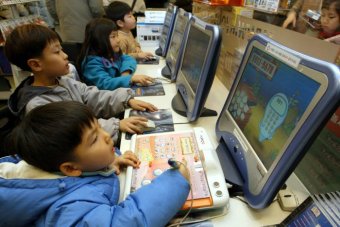South Korea has the highest rate of internet addiction in the world and it is increasingly the country’s children who are spending every waking moment immersed in fantasy role play or gaming.
The government sees it as a national health crisis and is now taking drastic measures to help the countries 2 million addicts.
They have set up a network of boot camps across the nation to offer the kids of Korea a digital detox.
In the remote and pristine mountains of South Korea, about as far away as one can get from the country’s high-tech cities, teenage internet addicts are turning up for a 12-day boot camp.
Kyle Won’s addiction is out of control. He spends 10 hours a day on the internet. He was top of his class and now he has dropped out of his final year of high school. His mother, Han Jin Sook, brought him to the camp as a last resort.
“He’s become aggressive and angry and stressed towards people. He used to listen to us but now he doesn’t,” she said.
Kyle’s smartphone is taken away, locked up for safekeeping and then it is goodbye to his parents and to cyberspace.
I have relationships on the internet and a real distance has grown with my personalised friends and I know it’s not good.
Kyle Won, internet addict
“I’m really worried because I won’t have my phone for 12 days but I trust other things will fill my time,” he said.
About a dozen teenage boys live, eat, sleep at the camp and every day starts with exercises.
At first the counsellors encourage human interaction to get them socialising again; for many the only friends they have had are online.
Kyle, 18, said this was a problem for him.
“I have relationships on the internet and a real distance has grown with my personalised friends and I know it’s not good,” he said.
One of the basic ideas at the camp is to rebuild connections back to the real world and weaken ties to the virtual one to reclaim a childhood lost to the computer.
The job of the counsellors here is to get the kids to think about a future beyond the smartphone or iPad; to show them other possibilities and ultimately to try and bring back dreams and hopes that have been buried by their addictions.
Counsellor Shim Yong Chool said what the boys learned at camp had to be applied back in the home environment if treatment was to be successful..
“We teach them methods to self-manage their emotions and the desire to use the internet so they can continue to use them when they go back home,” Shim said.
The boys also undergo intense one-on-one counselling to work out any underlying causes of addiction like family conflicts or personality issues.
One in every 10 South Korean child an addict
South Korean psychiatrists are urging more action as they are finding evidence too much screen time is damaging developing brains.
Professor Kang Seak Young from Dankook University said the addiction was damaging critical thinking.
“It effects the frontal lobes which are important for critical analysis,” Kang said.
“Reading a book where one is guessing what happens in the story next shows activity in frontal lobes but playing internet games shows no activity.”
The camp may not offer a cure but after just two days Kyle said it was helping.
“It’s a step forward, I’m living without the internet and I do have an expectation, through the group exercises and counselling, that when I go home it will have an impact and I won’t use the internet as much,” he said.
South Korea is most wired nation on Earth. Virtually every home is connected with cheap high-speed broadband.
But it does have a cost — one on 10 kids are addicts — so the country is now learning how to manage and moderate its high-tech future.

